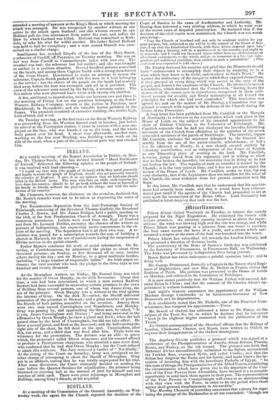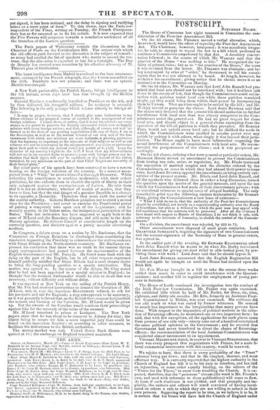itlistellantous.
Prince Albert 'visited Woolwich on Tuesday, to inspect the vessels prepared for the Niger Expedition. He examined the vessels with minute attention. An ominous casualty occurred to alarm the super- stitious: the wind 'was blowing high and the tide was strong, and while Prince Albert was passing in a pinnace from one vessel to another, the boat came across the bows of a yacht, and a crown which sur- mounted a sceptre at the stern of the boat was knocked into the water.
Prince Albert has subscribed 50/. towards the London Library, and has promised a donation of German books.
The anniversary of the Duke of Sussex's birth-day was celebrated by the fraternity of Freemasons, at Freemasons Hall, on Wednesday. The Duke was prevented by indisposition from being present.
Baron Bulow has twice undergone a painful operation lately ; and is doing welL Mr. George Drummond, formerly a Captain in the Ninety-third Regi- ment of Highlanders, and now Due de Melfort in France, claims the Earldom of Perth. His petition was presented to the House of Lords on Monday, and referred to the Committee of Privileges.
It is now stated positively that Sir William Parker will succeed Ad- miral Elliot in China ; and that the rumour of Sir Charles Adam's ap- pointment is without foundation.
Last night's Gazette announces the appointment of Sir William Maclean George Colebrooke to be Lieutenant-Governor of New Brunswick and its dependencies.
It is confidently stated that Mr. Nicholls, one of the Poor-law Com- missioners, has resigned his appointment. —Times.
Mr. Sewell of Oxford has addressed a letter to Dr. Pusey, on the subject of the Tract No. 90, in which he declares that he has never "been in the slightest degree connected with the publication of the Tracts."
An Oxford correspondent of the Standard affirms that the Bishops of London, Chichester, Chester, and Ripon, have written to Oxford to express their disapprobation of the Oxford theologians.
The Augsburg Gazelle publishes a protoeol which was signed at a conference of the Plenipotentiaries of Austria, Great Britain, Prussia,- Russia, and Turkey, on the 5th instant. The protocol sets forth that Mehemet Ali has unconditionally submitted to the Sultan, surrendered the Turkish fleet, evacuated Syria, and ceded Candia ; and that the Sultan has forgiven the Pasha and his family, and made known his in- tention of investing him with the hereditary Pashalic of Egypt. "In this state of things, the Plenipotentiaries of the Allied Courts, considering the circumstances which have given rise to the departure of the Con- suls of the Four Powers from Alexandria, have deemed it a seasonable opportunity to send back those agents to their post. The representatives of the Four Powers at Constantinople will come to an understanding with that view with the Porte, in order to fix the period when those agents shall proceed simultaneously to Alexandria." The Morning Chronicle of yesterday announces that a treaty for regu- lating the passage of the Dardanelles is all but concluded "though not The latest intelligence from Madrid is confined to the bare announce- ment, conveyed by the French telegraph, that the Cortes assembled on the 19th. Espartero was not present ; and there was no speech. Madrid was tranquiL
A New York packet-ship, the Patrick Henry, brings intelligence to the 8th instant, seven day a later ban that brought by the Halifax steamer.
General Harrison was formally installed as President on the 4th, and he then delivered his inaugural address. Its tendency is peaceful. The following is the only passage which relates directly to foreign af- fairs— " It may be proper, however, that I should give some indications to my fellow-citizens of my proposed course of conduct in the management of our foreign relations. I assure them, therefore, that it is my intention to use every means in my power to preserve the friendly intercourse which now so happily subsists with every foreign nation ; and that, although, of course, not well in- formed as to the state of any pending negotiations with any of them, I see in the Sovereigns, as well as in the mutual interest of our own and of the Go- vernments with which our relations are most intimate, a pleasing guarantee that the harmony so important to the interests of their subjects as well as our citizens will not be interrupted by the advancement of any claim or pretension upon their part to which our honour would not permit us to yield. Long the defender of my country's rights in the field, I trust that my fellow-citizens will not see in my earnest desire to preserve peace with foreign powers any in- dication that their rights will ever be sacrificed, or the honour of the nation tarnished, by any admission on the part of their Chief Magistrate unworthy of their former glory."
But other parts of his speech have been construed to have a remote bearing on the foreign relations of the country. In a manner unex- pected from a "Whig," he avows himself a thorough Democrat. While exhorting his countrymen to combine moderation with their ardent patriotism, he also exhorts them to cherish the spirit of liberty as their only safeguard against the encroachments of faction. He tells them that it is not an Aristocracy, whether of wealth or station, that they have to fear, but that the real danger of a genuine Republic is a change to its opposite, a Monarchy. Therefore they must curb the power of the central authority. General Harrison promises not to stand a second time for the Presidency ; and never to exercise the Presidential power of putting a temporary veto upon acts of the Legislature : and he roundly asserts, in the fullest sense, the independent jurisdiction of the States. This last intimation has been supposed to apply both to the case of M`Leod and the Boundary dispute, and still more to the Anti- Slavery agitation. He delivers himself at considerable length on the currency question, and declares agaiast a purely metallic circulating medium.
yet signed, it has been initiated, and the delay in signing and ratifying arises on a mere point of form." To this treaty, says the Paris cor- respondent of the Times, writing on Tuesday, the French Plenipoten- tiary has so far assented as to fix his initials. It is now expected that the Five Powers will cooperate towards a conclusive settlement of all the branches of the Eastern question.
The Paris papers of Wednesday contain the discussions in the Chamber of Peers on the Fortifications Bill. The ardour with which the old officers push forward to the discussion is the subject of remark : so many had swelled the list of speakers who meant to ascend the ros- trum, that the discession is expected to last for a fortnight. The Due de Broglie has created some sensation by his effective advocacy of M. Thiers's plan of fortification.
In Congress, a debate arose on a motion by Mr. Buchanan, that the Committee on Foreign Relations be discharged from considering the resolution requesting the Presiden; to communicate the correspondence with Great Britain on the North-eastern boundary: Mr. Buchanan ex- pressed his conviction that there was no truth in the rumour that an angry correspondence had passed between the representative of the English Government and Mr. Forsyth. He found some fault with the delay on the part of the English, but in all other respects expressed himself perfectly satisfied that Great Britain had a most sincere desire to bring the long-pending question to a speedy termination. The motion was agreed to. In the course of the debate, Mr. Clay stated that he had not been appointed to a special mission to England ; he thought that the resident Ambassador would be able to do all that was necessary, without difficulty and without delay.
It was reported at New York on the sailing of the Patrick Henry, that Mr. Fox had received instructions to demand the liberation of Mr. M`Leod, and, in case the American Government refused, to ask for Ins passports and sail for England; a step not expected to be necessary, as it was generally believed that, as the British Government had justified the seizure and burning of the Caroline, Mr. BPLeod would be given up. But the owners of the Caroline would continue their proceedings against him for the recovery of the value of the steamer.
Mr. M'Leod remained in prison at Lockport. The New York papers state that he was about to be removed to Albany for trial ; the object being to secure for him a more impartial jury than could be found on the immediate frontier ; or, according to other accounts, to facilitate his deliverance to the British authorities.
The money-market was dull. United States Bank Shares were quoted at 18; the exchange on England remained unaltered.



























 Previous page
Previous page